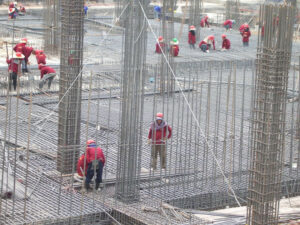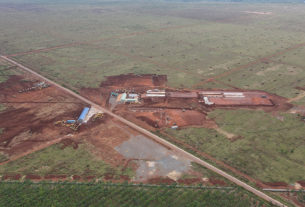
Grim outlook for Thai steelmakers
Industry reels amid Chinese dumping
Many local steel manufacturers are likely to shutter their businesses this year, succumbing to the flood of dumping from China, says the EAF Long Product Steel Producers Association.
Chinese steel imports have dented the capacity utilisation of Thailand’s steel industry, with the rate declining to 28% between January and February, marking a new low, said association president Chaichalerm Bunyanuwat.
“Thai steel manufacturers are concerned about this trend. They are hopeful the government will quickly implement additional measures to address the issue,” he said.
The association reported Thailand’s long steel production fell to roughly 6 million tonnes, down from about 7 million tonnes over the last 4-5 years.
“Long steel is essential for construction projects. Reduced production is likely to have repercussions for builders,” said Mr Chaichalerm.
According to the Commerce Ministry, up to 75 local steel companies ceased operations in 2023. The association is worried the number may rise this year.
Most local steel companies cannot compete with China’s steel costs, as Thailand struggles to adjust to the Carbon Border Adjustment Mechanism (CBAM), which took effect on Oct 1 last year, high electricity bills, increased daily wages, weakened purchasing power and the uneven economic recovery.
Under CBAM, businesses need to use more renewable power to avoid a non-tariff barrier if they export products to countries within the EU.
The transitional phase of CBAM, which started last October, requires importers of iron and steel, aluminium, cement, fertiliser, electricity and hydrogen to report greenhouse gas emissions embedded in their imports without being subject to financial payments or adjustments, according to the EU.
Importers are scheduled to pay a levy for CBAM certificates from Jan 1, 2026.
According to the association, China’s steelmakers increased their exports of steel products, including long steel and wire rod steel, by more than 37.5% year-on-year to 15.9 million tonnes during January and February, while the mainland’s steel production decreased by 0.4% year-on-year.
During the same period, Thai imports of steel from China increased by 18% year-on-year to 244,000 tonnes.
Tata Steel (Thailand) Plc (TSTH), a unit of India’s largest steelmaker, said earlier it is worried as China continues to dump cheap steel products in Southeast Asia as the Chinese economy decelerates.
Last year, the influx of low-cost imports from China surged by 39% to 1.47 million tonnes, according to TSTH president and chief executive Tarun Kuma Daga.
Asean members, including Thailand, Indonesia and Vietnam, have been severely affected by cheap steel imports from China, said Mr Daga.
The association projects Thailand’s steel consumption this year will exceed 16.3 million tonnes, surpassing last year’s total, based on government budget disbursement, a rebounding tourism industry and anticipated economic improvement.
Source: https://www.bangkokpost.com/business/general/2788094/grim-outlook-for-thai-steelmakers


